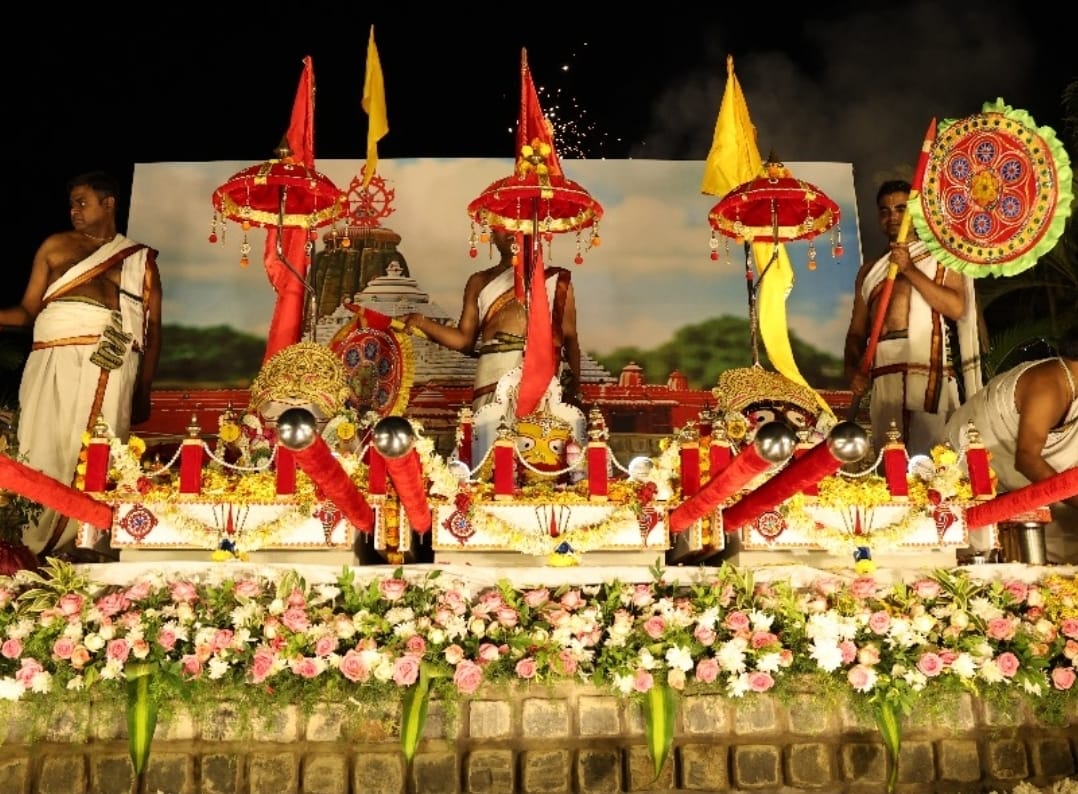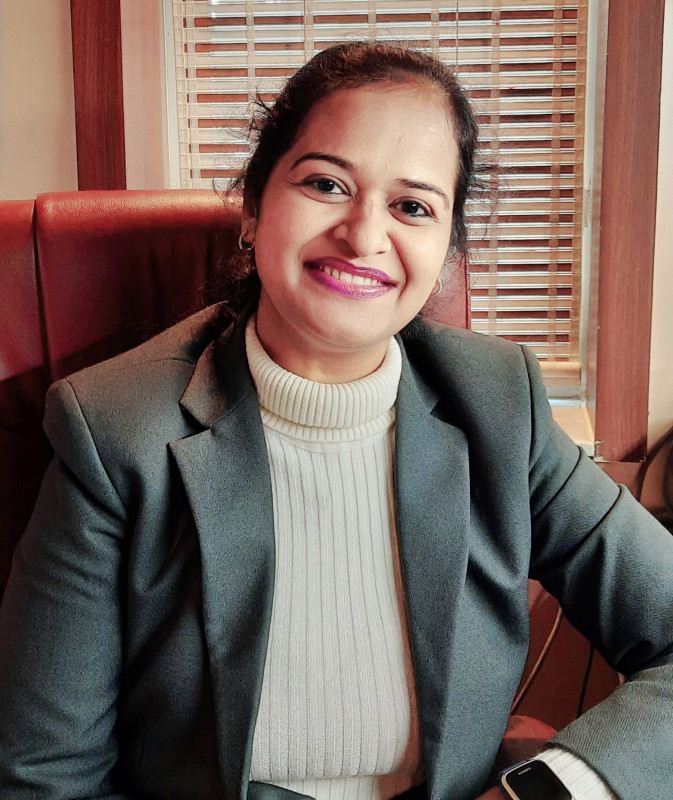
"Legacy is not what you did for yourself. It is what you are doing for the next generation."
In a world moving at the speed of Wi-Fi, where festivals are reduced to forwarded messages and prayers are background noise to ringing phones, a miracle unfolded in the heart of metropolitan Bengaluru. And it wasn’t in a temple or a monastery—but in the very pulse of a modern housing society.
The first-ever Jagannath Rath Yatra at Purva Fountain Square (PFS) wasn’t just a religious event—it was a spiritual resurrection. A reminder that divinity needs no palaces to arrive. It needs no bells or conch shells to be summoned. It only needs intention, purity, and surrender.
A City Awakened – When Concrete Met Consciousness
In the maze of Marathahalli’s high-rises and under the hum of IT parks, something ancient stirred. When the palakis of Lord Jagannath, Balabhadra, and Subhadra Maiya moved through the streets of PFS, it wasn’t just gods who were carried—it was an entire community’s yearning for something deeper, something true.
Over 750 residents gathered—not for a protest, not for a society meeting, but for a celebration of the soul.
They came with flowers in their hands, children by their side, and bhakti in their hearts. They chanted. They danced. They wept. Not because they were sad, but because something forgotten had returned.
As a life coach and psychologist, I have spent years understanding the silent pain that seeps into urban lives—the disconnection, the anxiety, the constant pursuit of “more.” But that evening, in the soft golden light of diyas, I saw something I wish every therapist’s room could witness—collective healing.
“The Real Legacy Is Not Built in Silicon, But in Sanskaar.”
We often worry about what we will leave behind—bank accounts, properties, securities. But have we ever paused to ask:
What values are we depositing into the hearts of our children?
Children don’t inherit our words. They inherit our ways.
They learn how we speak when society meetings get heated.
They absorb whether we fold our hands during a prayer or just scroll through it.
They watch how we treat elders—not during speeches—but during everyday dinners.
At PFS, during the Rath Yatra, the message was crystal clear: Legacy begins at home.
We don’t need to send our children to Varanasi to experience culture. We need to bring Varanasi home—into our balconies, our dining tables, our daily routines.
The Kitchens Became Temples
It wasn’t just the pandals that were sacred. The kitchens turned divine altars.
Mothers, many of whom balance demanding jobs and family life, rose before dawn—not to check emails—but to prepare 108 bhoga items. With trembling hands and tear-filled eyes, they offered each dish as a prayer, not a performance.
As the Founder of Vigyan Saroj Care Foundation, I’ve seen women create revolutions quietly. This was one such revolution. Where gas stoves were lit not for sustenance but for seva. Where every laddu carried a mantra. Every pakodi, a hymn.
Fathers who often walk in late from work lifted palakis with reverence. I saw in their eyes the fatigue of city life melting into devotion. There were no caste, no class, no ego—only souls bowing together.
The Screens Were Replaced by Satsang
And what of the children?
They weren’t swiping screens. They were ringing bells. Not gaming—they were dancing in Sankirtan.
In a world where it’s easier to get a child to watch Peppa Pig than chant “Hare Krishna,” we witnessed a spiritual U-turn.
Children twirled around the palakis with the kind of joy no video game can simulate. It wasn’t gamified—but it was glorified. The glow in their faces said it all: "This is who we are."
"Culture Is Not Taught, It Is Caught."
As an entrepreneur and CEO of DVAR Consultancy Pvt. Ltd., I often speak about building systems, scaling growth, and empowering people. But what happened at PFS that day was a different kind of empowerment—soul empowerment.
Because when people feel connected to something higher than themselves, they don’t just live—they blossom.
The Rath Yatra wasn’t organized by a priestly class. It was built by residents, homemakers, engineers, HR professionals, and school children. They stitched decorations, arranged prasad, organized sankirtan—together. And in doing so, they didn’t just create an event—they carved out eternal belonging.
Let Our Societies Become Sacred Spaces
I urge every urban housing society reading this—don’t wait. Don’t wait for someone else to bring God in. Become the channel.
Let us not use our WhatsApp groups only for parking complaints and AGM announcements. Let them also resonate with seva planning, satsang schedules, and bhajan playlists.
Let us transform our community halls into havans of harmony. Let the children’s play area become a stage for Ramayana skits. Let us reclaim our shared spaces, not just for entertainment, but for enlightenment.
“The Divine Doesn’t Seek Mansions – Only Pure Hearts.”
I return again to this line because it’s the one that echoed through my heart as I watched the PFS gardens transform into a sacred scape.
Usually reserved for Sunday parties and weekend barbecues, those gardens had become the Vrindavan Gardens—not by magic, but by mindset.
It is not about how rich a society is in amenities. It is about how rich it is in unity and devotion.
Let us not just raise children, but raise devotion in them.
Let us not just build lives, but build legacies that are worth remembering.
“We Didn’t Just Organize A Rath Yatra. We Awakened A Civilization.”
This wasn’t a one-time celebration. This was the beginning of a cultural revolution in metropolitan India.
And you don’t need to be religious to participate. You just need to be human.
Because somewhere, beneath the layers of modernity, board meetings, traffic jams, and Netflix nights, we are all seekers. We all crave depth. Meaning. Connection. And events like this pull us back—not to the past—but to our purpose.
A Final Word From the Heart of a Seeker
As a seeker myself, I write this not just as a professor or a CEO—but as a soul who has seen what happens when humans choose connection over comfort, devotion over distraction, and culture over convenience.
If each society in India recreated this miracle, we wouldn’t just see festivals revived—we would see families healed, children centered, and generations transformed.
When Puri came to PFS, it did not bring rituals—it brought remembrance.
Let that remembrance not fade. Let it ripple. Let it rise.
And let us all become co-creators of a legacy beyond time.
“In the end, we will not be remembered by the walls we built or the cars we drove.
We will be remembered by the values we passed on, the love we shared, and the light we left behind in the hearts we touched.”

